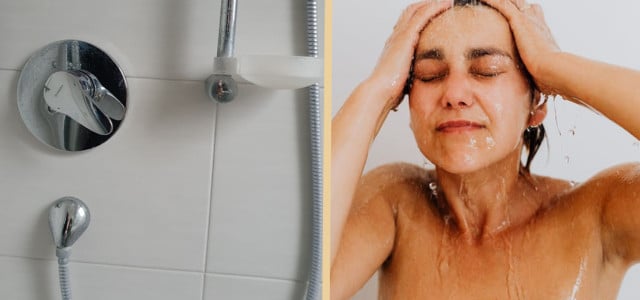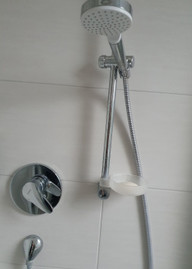
Saving energy and strengthening the immune system at the same time – these are just two reasons why people are currently taking cold showers. Can a cold shower really do that much good? Our author has subjected herself to a self-test for more than 20 weeks – with a mixed conclusion.
When it comes to saving energy, some consumers are becoming increasingly inventive: they unplug the fridge in winter, heat water for boiling in a kettle beforehand, or get a tea light oven. Unfortunately, some of the savings tricks turn out to be energy-saving myths on closer inspection.
Do cold showers also fall into this category? Or does cold water not only save money, but even have health benefits? I asked my family doctor and tried it myself.
Cold showers: can that be healthy?
A cold shower isn’t a problem in summer – but now in winter only real professionals can do it, that’s my assessment so far. But I wanted to know more about it and tried cold showers for a long time. In the process, I found out a lot about myself.
Cold showers have had loyal fans for many years, who swear by the health benefits of the cold shock under the shower. Studies have shown that cold showers are not only healthy, but are even said to help you lose weight and release endorphins.
Since that sounds almost too good to be true to me, I consulted Dr. Jakob Berger, general practitioner and district chairman of the Bavarian Association of General Practitioners. It’s true that a cold shower stimulates circulation and blood flow. In addition, the immune system is stimulated and the mucous membranes are also better supplied with blood through cold water, which leads to a stronger immune system.
Cold water also has advantages for skin and hair: It is gentler, while hot water can degrease the skin too much. “When you take a cold shower, the blood vessels first contract and then expand. This leads to better tension in the skin,” adds Dr. Berger.
In this case, you should not take a cold shower
In the case of severe colds, however, cold showers are only recommended to a limited extent. If the body is already weak, the cold shock can put too much strain on it. In winter, the following also applies: Never go outside or to bed with wet hair, but dry it well beforehand.

dr Berger made it clear to Utopia that there is nothing wrong with taking a cold shower, even if you have a cold. However, if you are already freezing before the shower, it is better to turn the water warmer and not torment yourself unnecessarily.
Already in autumn Dr. Berger tell us whether freezing makes you sick or toughens you up.
Not just health benefits: a cold shower saves energy
Turning the water on cold in the shower doesn’t just have health benefits. This also saves you a lot of energy. Because hot water generation is energy-intensive – and with the current high energy costs, this can be expensive.
About twelve to 15 liters of water run through a conventional shower head per minute. With a very short five-minute shower, this results in more than 60 liters of hot water – and thus a lot of savings potential.
Taking a cold shower as a self-test: my experiment was that successful
Better blood circulation and lower energy consumption – let’s try the cold shower yourself. I benefited from the following points:
- I’ve never been a long showerer who stood under the warm jet of water forever. That’s why I can’t really miss it.
- Basically, I like to give priority to saving over comfort or luxury. So my motivation was high.
In the summer I always like to take a lukewarm or cold shower and use it as a refreshment on hot days. This year, after the summer, I “simply” didn’t switch back to the warm shower, but stayed on the cold level.
With that, I can now look back on five months of cold showers – and I’m still at it. When it got colder outside and therefore also in my bathroom, I found taking cold showers really challenging at times. On some days I really had to overcome myself to stand under the jet of cold water.
My washing routine – taking a cold shower needs to be learned
But I’ve developed a fixed routine that works well for me: First, I wet my hair and shampoo it. Since I have long hair, the body does not really get wet. Then I dip both legs under the jet of water, one after the other, then my arms and finally I wet my back and stomach.
Before I use shower gel, I turn the water off again. I’ve always done it this way out of habit, since I’ve been taking a cold shower it’s become even more natural. Overall, I try to spend as little time as possible under the cold water. Finally, the hair is rinsed out and everything is showered off as quickly as possible – done.
Have I ever become weak? Once or twice yes. That was for a specific reason, in my defense: the water in the shower was still warm because my husband had just taken a shower.
Also interesting: Is a shower once a week enough? Non-bathing in the self-test
Conclusion: Cold showers remain a challenge (not that big anymore).
My findings from the self-test? I can also bring myself to stand under cold running water in the long term. I’m a bit proud of that.

So far I have not noticed any major effects on my health. I’ve still managed to avoid a bad cold – but I don’t just attribute that to the cold shower, but also to a lot of hot ginger tea, among other things.
If I should still catch a cold, I will take the following advice from Dr. Follow Berger: An ascending foot bath. You stretch your feet in warm water and slowly pour hot water in, so that the temperature in the foot bath continues to rise.
It’s not always easy for me, but I try to keep the shower cold. Even if my body hasn’t quite gotten used to the cold water, at least my head has adjusted to it and I automatically leave the faucet on blue. After the shower I am satisfied every time.
Waiting for the habituation effect
I’m counting on the fact that at some point you’ll get used to it physically. family doctor dr Berger assured me that you can toughen up and get used to the cold water. But I’m still going on more out of conviction than because of the great health benefits – and because of the much hot water saved.
Because since I’ve been taking a cold shower, it’s even faster: I no longer let the water run warm, but immediately dip my head in the cold water. When lathering up, the water is turned off anyway and I don’t stand in the jet of water for a second longer than necessary. In addition, I bought an energy-saving shower head in the summer, which I am very satisfied with. In addition to this, we have other tips for saving money in the shower.
If you want to try cold showers, it is best to start slowly and only turn the water to lukewarm at first. After that you can set it a little colder from shower to shower. Or to put it in the words of Dr. Berger to say: “You don’t have to do it to the extreme at the beginning”.
Read more on Techzle.com:
- 15 tips for saving energy in the bathroom: How to reduce electricity and water consumption
- Does a reduced water temperature increase the risk of legionella?
- How often should you change towels?